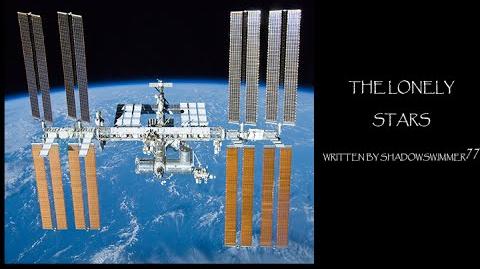Author's note: this story was originally in response to Natalo's request for a story that ended with the lines, "in that moment everything became clear. I knew I could never go back." However, after the contest concluded, I decided I liked the ending better without those two lines.

“Houston, come in. This is UN Space Station Libra. Come in, Houston.”
No reply, just like every other time. I throw the receiver in disgust, the weightless environment causing it to float mockingly in front of my face at the end of its retention strap. I'm bathed in the soft red glow of emergency lights that serve to illuminate every inch of my tiny cell. I take a deep breath to calm my nerves before returning to fiddle at the maintenance panel. I've been in here for two weeks now.
Libra was designed as the successor to the International Space Station. Typically there is a minimum two crew on board at any one time. I was supposed to be out of here three weeks ago with the British and Chinese astronauts who came up with me, but unfortunately, the replacements had some mechanical complications, and then nasty weather delayed the Moscow launch another week. Even so, they should have been here days ago.
“You sure you'll be all right up here by yourself, mate?”
“Sure. Somebody's gotta keep the lights on. Besides, the Russkies will be here soon. Just have a drink for me when you get landside, yeah?”
“I expect I'll have two. Godspeed.”
I was ready to spend seven to ten days by myself on the station, waiting for the Russians to get their act together and get me my ride home. I'd done some time in an isolation chamber during my training, so I knew how to handle being stuck in a confined space with myself; the trick is to not listen to the voices. The station itself isn't roomy, but it has five different modular compartments, more than enough space for one person to not feel enclosed. Even better, every module except for the emergency cell has specially reinforced portholes giving magnificent views of the earth far below. It was photos of this breathtaking panorama that had first driven me into the NASA program almost twenty years ago, so what better way to spend a week than by gazing at the world in all its glory? Since our planned experiments were complete, other than basic maintenance that's exactly what I spent the first several days doing. I could lose myself for hours watching the whirling blues and browns fly by underneath, the sun rising and setting every time I completed an orbit. Then came the event.
Five days into my lonely vigil I'd been roughly woken by a blaring alarm; Houston was trying to reach me, and they needed me now.
“What's going on, Houston?”
“Weird readings, Libra. Satellites register some sort of anomaly we're just now picking up. Don't know if it's solar flares, some kind of field left behind by a passing comet, or something else. We'll be moving into the area within the hour. There's no telling how the systems are going to respond. Better button up in the emergency cell until we're through”
“How long will that be?”
“Don't know...we'll be in touch.”
It was good advice. Alarms started sounding almost exactly sixty minutes later and abruptly whole sections of the station's instrument panels started shutting down. I was able to keep track of everything that was going on from the master controls in the emergency cell, so I knew exactly when power to the station completely cut out. There was a tense five to ten seconds before the emergency batteries kicked in. Then with a soft whine, they powered up the red lights I'd been basking in ever since.
I pause my work at the maintenance panel. For the thousandth time, I take out the photo of my wife and daughter. They're both smiling, holding each other close.
Are you going to space again, daddy?
Yes, honey, but not for too long this time.
I don't want you to go.
Don't worry, I'll be back before you know it.
The emergency batteries are designed to provide minimum function, pretty much just life support and basic communications. Theoretically, they'll last long enough that I'll have to be more concerned with running out of food and recycled water before worrying if they're going to run dry. But I'm blind and deaf in here. The communications are rudimentary, designed to run on almost no power, so it's small wonder I haven't been able to reach Houston. I have to do something. I can't even see outside since the emergency cell was designed specifically without any kind of view port. The walls are starting to close in, and in a cell this small there's not much room to shrink. At least the voices haven't started yet. Like I said, the trick is to avoid them, but in here there's nowhere to run, nothing to distract my mind.
The main system is powered by exterior solar panels. The system had been tested and retested to automatically restart in the event of a catastrophic failure, but when it actually counted, something stopped the reset. After a day or two, I decided to take matters into my own hands and popped the cover of the maintenance panel. After two weeks I've gotten exactly zero response for my efforts.
As I put the photo of my family back in my pocket, the fear and unfairness of it all momentarily get the better of me. Dammit, I was supposed to be home weeks ago! In frustration, I hit the panel as hard as I can with my open hand. Amazingly, that does the trick.
With a click and a whir, the red lights shift to white and the instrument panels begin powering up to their fully operational state. Ecstatic, I throw myself across the cell to the communication array.
“Houston, Houston, come in. This is space station Libra.”
I try the line for twenty minutes. Still no response. What the hell is going on? A gnawing pit is growing in the base of my stomach. While the system was down, I could make excuses for the radio silence, use them to keep the panicky feeling to a dull roar. But now...
I have to get out of this stupid cell. I may not be able to talk to the people down there, but at least I can watch them. If I imagine hard enough maybe I'll see my little girl, looking to the sky to see if she can spy the station as it passes overhead. I unseal the airlock and move to the next module. I chuckle to myself; maybe I'll be able to see my replacements' shuttle. I peer through the view port. Then, frantically, I move from module to module looking through each porthole in turn, the pit growing deeper with each passing moment.
She doesn't want you to go.
She's a kid. Of course she doesn't want me to go.
I don't want you to go either.
I know. But?
But I know you will anyway. And I won't stop you.
I love you, babe.
I love you too.
Always...
It takes the station's computer two hours to identify our position. Finally, it finds enough known stars to triangulate where we are; exactly where we should be, two weeks after the last measurements were taken. The rest of the universe, though, is a little off, ahead of itself by about fifteen hundred years. In my gut, I'd already known that though. I'd known when I looked through the view port and didn't see the big, beautiful earth shining below me, just the dark, empty blackness of space filled by only a few, lonely stars.
Narrations
Written by Shadowswimmer77
Content is available under CC BY-NC
Previous Story: A Bad Night
Next Story: The Fishing Trip










